TV: Baby Reindeer (2024)
A shocking plunge into the traumas of a frightened, troubled comedian
Donny (Richard Gadd) and Martha (Jessica Gunning) in their first fateful meeting
Baby Reindeer (2024)
Streaming on Netflix, 7 episodes
I’ve never begun a review with a warning, but I feel duty bound to do so with this new series. At the opening onscreen we read This is a true story. Don’t pass over those words too rapidly. They’ll bear on what you’re about to witness.
We’ve seen the tags based on a true story or inspired by real events at the beginnings of movies and TV shows. Yeah, sure, we say to ourselves. But believing one whit of it, we silently say back to the screen, is up to us. Just get on with the story, please.
That’s how we start watching here. Jolts and dire questions of credibility quickly ensue. This slash and burn morality play, with its “truth” content hovering in abeyance, is one of the most tightly rendered psychodramas I’ve seen.
On every level it’s impressively executed, a wild, harrowing ride through psychosexual territory that I’m not sure TV has ventured this deeply into before.
The screenwriter is Scottish comedian Richard Gadd, who’s also an actor, and he plays Donny Dunn, a Scottish comedian in his mid-30s based, Gadd has explained, on his own personal and professional life. Feeling a little confused? Hang in. For now, let’s concentrate on Gadd as a performer.
He’s captivating, making Donny a sad, ruefully self-pitying raconteur. Told nearly entirely in confessional voiceover, Donny’s pathetic tale begins when we see him on stage in a goofy red-orange glen plaid suit as a hapless stand-up comic whose career is going nowhere.
Donny struggles to wring laughs from indifferent to rowdily hostile audiences
Making next to no money, he supports himself as a barman in a London pub, where he’s occasionally allowed to put on brief shows for a bored, baffled audience of pub regulars, who are never laughing with him, only at his desperate routines.
One day while he’s serving behind the bar, in walks Martha Scott (Jessica Gunning), a plus-size woman in her early 40s who chirpily claims she’s a lawyer and asks Donny if he’ll buy her a Diet Coke, which she says she can’t afford.
Donny at once sees the contradiction of a lawyer who can’t afford a soft drink, but he’s so taken with her snappy humor and lilting non-stop chatter he gladly spots her for a cup of tea.
As Martha keeps paying return visits to the pub and becomes more brazenly flirtatious, Donny realizes she’s taken a romantic fancy to him. Her teasing becomes bawdier, her come-ons more lurid and graphic. She’s amusing, sort of, to Donny and to us, but increasingly creepy.
She gets hold of his phone number and email address, and excitedly courts him as friend, possible lover, confidante and – why not? – potential life partner. In between her “seductive” visits to the pub, countless emails and texts from Martha flow onto Donny’s phone and computer, at all hours.
Her messages are mashups of weird misspellings, outrageous flirting and increasingly ominous threats. She dubs him her “baby reindeer”, without explaining the handle.
So, here we have another crazed female stalker as in Fatal Attraction (1987), right? No, not actually. Donny’s prospects may look puny, but by Episode 3 we see that he has a fuller store of dreams than mad Martha can dredge up from him.
Nava Mau is Teri, a trans woman who tries to pull Danny back from self-destruction
He meets Teri (Nava Mau), a trans woman he’s at first put off by. But once she shames him into working through his unease with her, he begins to get serious.
In stark contrast to the loopy Martha, Teri is a poised psychoanalyst who’s also a cool judge of character. She understands Donny will need time to envision a possible relationship with her, and she slowly wins his trust in and out of bed.
So, maybe now Donny can cast Martha aside? Not when she angrily confronts the two of them and in a foul-mouthed rage physically attacks Teri. Teri warns Donny that if he doesn’t banish the unhinged Martha from his life he’ll become as crazy as she is. They could, she suggests, be two of a kind.
As Donny struggles to figure out how to ditch Martha, we learn that sometime before his other obsession – to become a famous comedian – had deepened and darkened.
Before Martha crashed into his life, a joyful visit to perform at the Edinburgh Fringe Festival had revived the flailing Donny’s hopes.
Back in London, he was lively and self-confident when one night a successful middle-aged TV producer, Darrien (Tom Goodman-Hill), dropped into the pub. The near-dead audience response to Donny’s act didn’t faze the seasoned Darrien.
He convinced Donny that he could help polish the comic’s act and even get the TV script Donny has secretly been crafting produced.
I can only state the obvious, that messes aren’t neatly cleaned up or left behind. The script leaves us with a painful, I think instructive, ambiguity.
It’s not an easy watch, but I think it can make the squeamish a bit less loath and more wised up if they stick with it.
Watching this long flashback, we realize before poor Donny – so bedazzled is he by this shot at success – that Darrien is a slick, sick manipulator.
While helping Donny to strengthen his routines and hone his performing skills, Darrien also coaxed him into drug marathons fueled by alcohol, sped up by hallucinatory substances. Donny descended into a dazed, “blissful” numbness.
This grooming wore down Donny’s resistance, until he found himself a pliable sex object to Darrien’s erotic guru. Seduction hadn’t entirely satisfied Darrien, however, so, after drugging Donny into a stupor, he calculatedly, roughly raped him.
More than once. Sore, ashamed and frightened, so in thrall was Donny he had trouble comprehending how low he’d fallen.
These are extraordinarily graphic scenes which, while never gratuitous, make for a remarkable sort of probe of demoralized characters that TV has been skittish about.
Its shattering interiority is where Baby Reindeer ventures into what I think is a new psychological arena for TV drama. Even ghastly abuse can fall into a grey area. Donny isn’t, in absolute terms, a victim. He’d been sucking up to Darrien as willingly and covetously as the producer exploited and undermined him.
It was a profound co-dependence whose lopsidedness Donny didn’t catch onto fast enough. When he writhed in pain and shame, gasping and vomiting in drugged hell, he was forced to admit that he wasn’t entirely blameless.
This unwillingness to look far enough into himself to recognize the empty space he’s been trying to fill chasing “success” is the central personal unraveling we’re meant to take stock of.
At the bus stop opposite Donny’s flat Martha waits hours for a glimpse of her “love”
Uncannily, Martha senses the open wound — the madcap comedian has been raped — that Donny is desperately hiding. She strikes, taunting him, “Somebody hurt you, didn’t they?” she taunts. It’s the same pressure of pain, the area of fatal fear and shame, that Teri wisely tells Donny he must surmount.
Does he? You’ll need to watch. Shuddering to the end, since three people have opened Donny up, wide, and we see the strain nearly wiping him out.
The script leaves us with a painful, I think instructive, ambiguity. I admire the writing because we can be sure that no matter how harshly we judge Donny, he’s going to be even harder on himself.
Netflix took a dare producing this complex, knotty series by a comedian/actor who’d written a handful of TV episodes and radio scripts. Its anguish is palpable, and I don’t believe its overt bi-sexual thrashing has been examined this clinically before.
It’s not an easy watch, but I think it can make the squeamish a bit less loath and more wised up if they stick with it.
What should help them is Krzysztof Trojnar’s handsome cinematography. The sunlit, inviting pub is set off against the hot gaslit-feel of the nightclubs, with their chipper British music hall rowdiness.
The moody, sometimes ominous interiors glow deceptively, setting Donny up for mental and bodily thwacks. The alcohol, drug, and sometimes shockingly violent sex interludes with Darrien, surprisingly, aren't as hard to watch as it first seems they will be.
It’s a conscious choice that the lighting of these scenes isn’t doom-laden or judgmental. We’re confronted with Donny’s muddle out of the blue, just as he is. We’re more bewildered than repulsed, on edge but not ready to give up on this bloke who’s his own worst enemy but who might somehow pull himself up.
In this story’s unending moral haze, director Josephine Bornebusch allows the cast a full head of steam and their acting burns through the fog.
Gadd gives the kind of performance that many actors don’t often dare to or are given the chance to. More than half the time he speaks in voiceover, while to the camera he’s always a nervous wreck.
Yet his voice has a steadiness, a moral cadence, that keeps us hoping that at some point Donny’s comedy will click with an audience, he’ll come to his senses and maybe gain a measure of self-respect.
Whether Donny is screaming at Martha to keep away or lying to Teri about how he’s trying to disentangle himself, or telling Darrien he’s fine when he knows he’s being used as a sex toy, we can hear the mortal howl – the plea for help – underneath.
Fine as Gadd is, Jessica Gunning as Martha gives the series’ rawest, best performance. Her girlish, dirty-mouthed flirting at the beginning feels like giddy, throwaway naughtiness. But in her growing panic at losing Donny, she turns ugly.
When she sits in the audience in the bar harassing and insulting Donny, we can see she’s grown past realistically caring about the object of her “affections”. She descends into a remote almost animal trance like nothing I’ve seen since Isabelle Adjani's catatonic, devastated failure of love in Truffaut’s Story of Adele H (1975).
When the police must finally arrest Martha, Gunning keeps us asking what drives this deeply disturbed woman, a stalker with no clear endgame. She seems to revel in tormenting Donny as he tries to push her away even more than she relished possibly landing him.
Actually, that “happy” outcome must have always seemed remote. She, like Donny, is in a self-punishing trap. What links her to Donny isn’t their opposition but their similarity. They’re both looking for someone to bestow even a glimmer of absolution on the parts of themselves they can’t help despising.
A terrified Donny pauses alone in the nighttime, trying to escape his own tangled web
Gadd’s writing sometimes slips into sentiment. He creates wonderful scenes with Donny’s parents, but their acceptance of, and identifying with, their son’s suffering feels a bit rushed, truncated.
And Teri as a trans woman is sometimes used too glibly. Just when we think she’s fed up with Donny’s indecisiveness, she becomes a helpmate, and we never quite see what’s in it for her.
But Nava Mau makes a stirring impression in the role. Teri is a trans woman who won’t tolerate men who can’t make up their “masterful” masculine minds.
She refuses to let Donny get away with not facing his darkest truths. I think this role and Mau’s polished depiction mark a welcome step forward both for trans characters and trans actors.
As for my musing at the beginning about This is a true story, controversy has arisen since the series’ release. Gadd implored audiences not to try to track down the real Martha, but online sleuthing can be pestilential, and the woman has been found.
She’s given an interview where she insists that Gadd has mischaracterized her actions. She claims to have sent him a few dozen emails and texts, not the hundreds the script would have us believe.
Most importantly, she denies ever having behaved violently toward Gadd, and that during much of their interaction he stalked her, not the other way around. Gadd hasn’t yet responded directly.
So, is this “true” story to some degree fictitious? Gadd has said that some characters and situations were embellished but beyond that he stands by the events in the series as largely, I think he’d say overwhelmingly, factual.
It’s a fair question to ask of movies or TV series whether what we’re shown represents reality or transforms it into something perhaps more easily assimilated.
That persistent quandary won’t be resolved anytime soon. In the meantime, I think we have in Baby Reindeer a truthful – I won’t say true – depiction of roiling lives that are recognizable in the world around us.

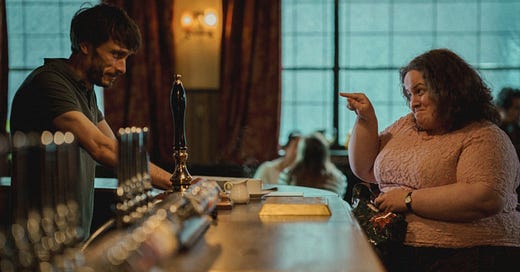



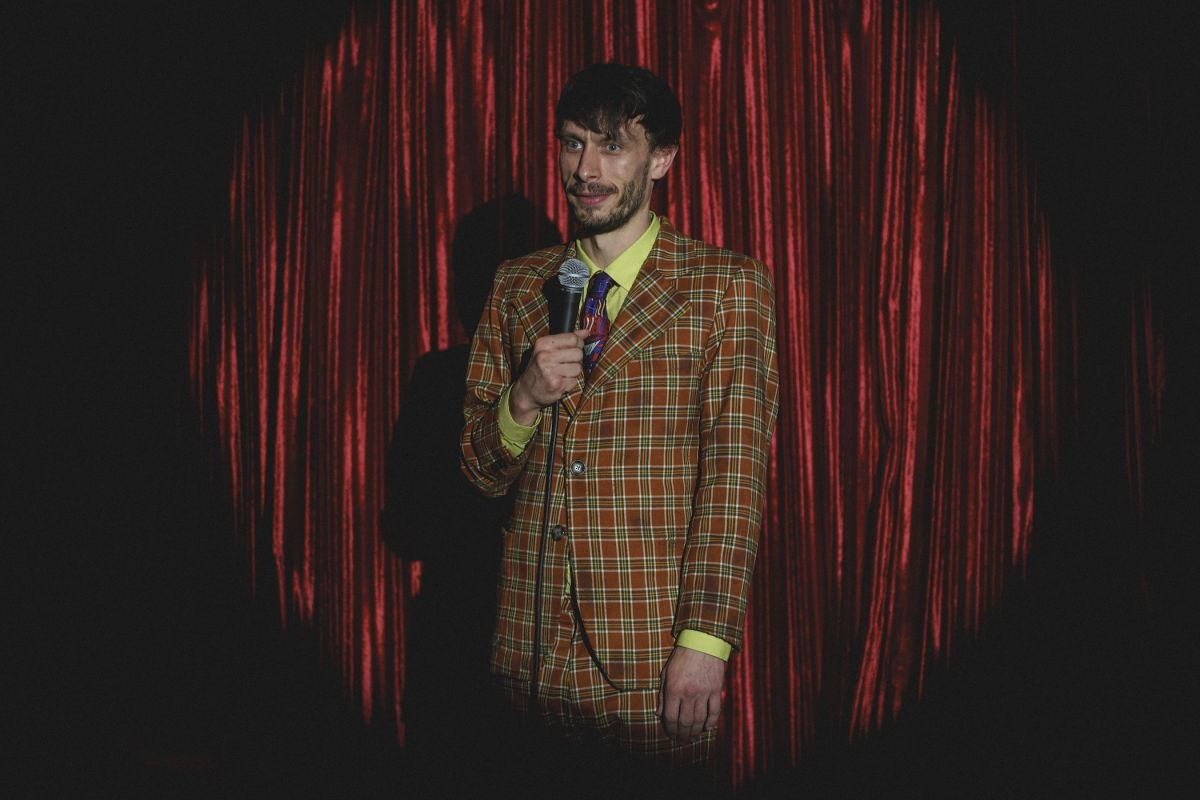
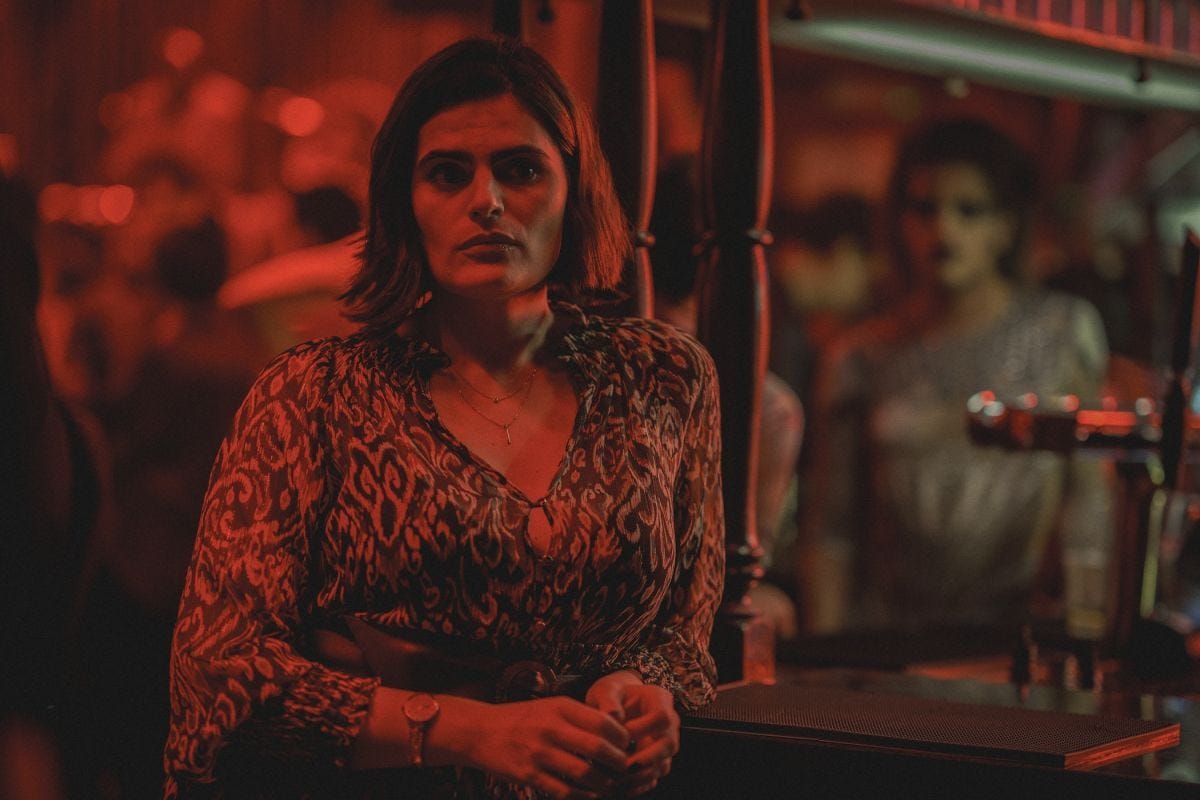
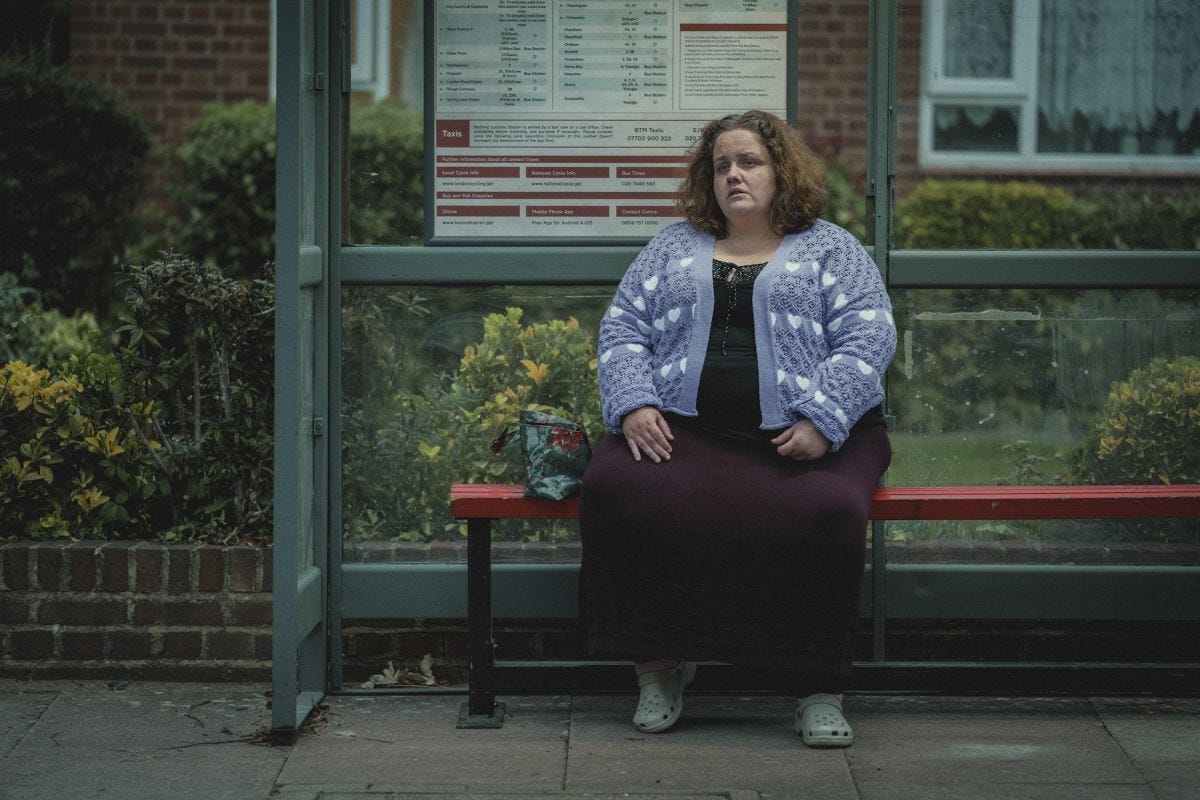
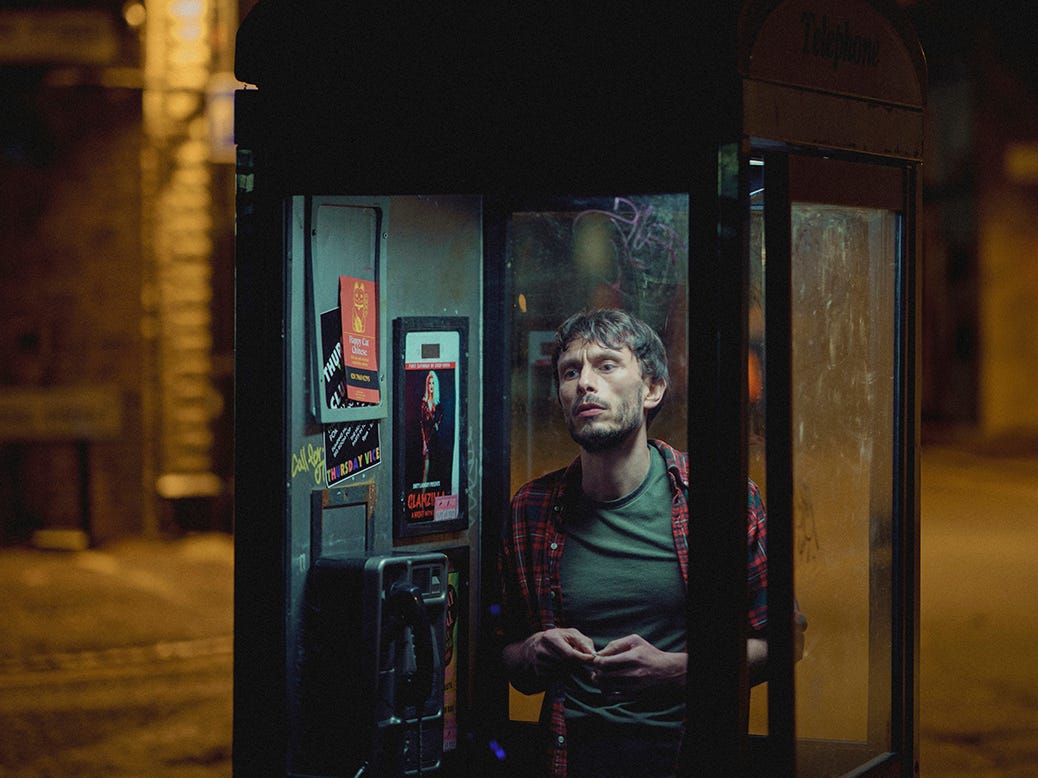
Good to see your review right after finishing the series last night. Loved it. The last episode was profoundly moving to me and tied the whole thing together. I'll be thinking about these characters for a long time. As an aside, I actually missed Martha in the one flashback episode, which I thought was the weakest without her. Great actors, all of them.